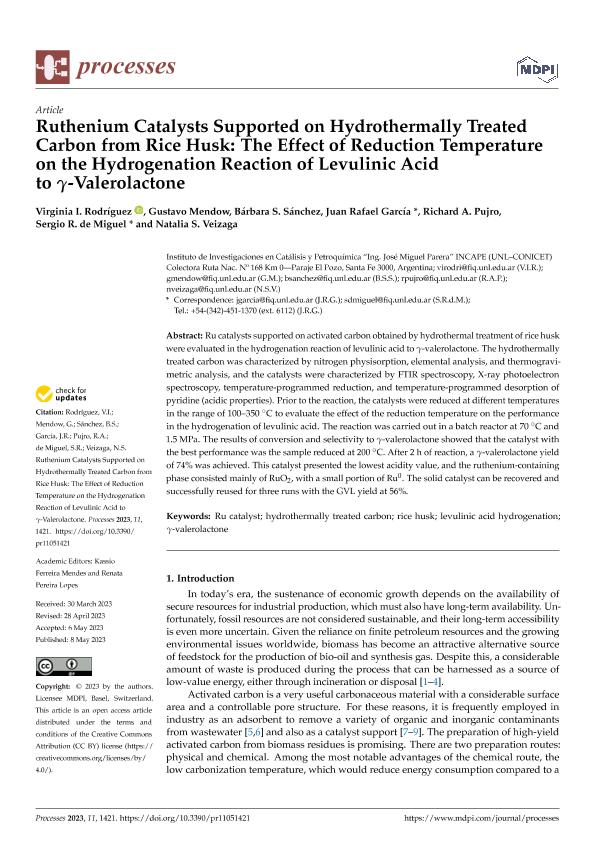Artículo
Ruthenium Catalysts Supported on Hydrothermally Treated Carbon from Rice Husk: The Effect of Reduction Temperature on the Hydrogenation Reaction of Levulinic Acid to γ-Valerolactone
Rodriguez, Virginia Ines ; Mendow, Gustavo
; Mendow, Gustavo ; Sanchez, Barbara Sabrina
; Sanchez, Barbara Sabrina ; García, Juan Rafael
; García, Juan Rafael ; Pujro Tarquino, Richard Alfonzo
; Pujro Tarquino, Richard Alfonzo ; de Miguel, Sergio Ruben
; de Miguel, Sergio Ruben ; Veizaga, Natalia Soledad
; Veizaga, Natalia Soledad
 ; Mendow, Gustavo
; Mendow, Gustavo ; Sanchez, Barbara Sabrina
; Sanchez, Barbara Sabrina ; García, Juan Rafael
; García, Juan Rafael ; Pujro Tarquino, Richard Alfonzo
; Pujro Tarquino, Richard Alfonzo ; de Miguel, Sergio Ruben
; de Miguel, Sergio Ruben ; Veizaga, Natalia Soledad
; Veizaga, Natalia Soledad
Fecha de publicación:
05/2023
Editorial:
Multidisciplinary Digital Publishing Institute
Revista:
Processes
e-ISSN:
2227-9717
Idioma:
Inglés
Tipo de recurso:
Artículo publicado
Clasificación temática:
Resumen
Ru catalysts supported on activated carbon obtained by hydrothermal treatment of rice husk were evaluated in the hydrogenation reaction of levulinic acid to g-valerolactone. The hydrothermally treated carbon was characterized by nitrogen physisorption, elemental analysis, and thermogravimetric analysis, and the catalysts were characterized by FTIR spectroscopy, X-ray photoelectron spectroscopy, temperature-programmed reduction, and temperature-programmed desorption of pyridine (acidic properties). Prior to the reaction, the catalysts were reduced at different temperatures in the range of 100–350 C to evaluate the effect of the reduction temperature on the performance in the hydrogenation of levulinic acid. The reaction was carried out in a batch reactor at 70 C and 1.5 MPa. The results of conversion and selectivity to g-valerolactone showed that the catalyst with the best performance was the sample reduced at 200 C. After 2 h of reaction, a g-valerolactone yieldof 74% was achieved. This catalyst presented the lowest acidity value, and the ruthenium-containing phase consisted mainly of RuO2, with a small portion of Ru0. The solid catalyst can be recovered and successfully reused for three runs with the GVL yield at 56%.
Archivos asociados
Licencia
Identificadores
Colecciones
Articulos(INCAPE)
Articulos de INST.DE INVEST.EN CATALISIS Y PETROQUIMICA "ING. JOSE MIGUEL PARERA"
Articulos de INST.DE INVEST.EN CATALISIS Y PETROQUIMICA "ING. JOSE MIGUEL PARERA"
Citación
Rodriguez, Virginia Ines; Mendow, Gustavo; Sanchez, Barbara Sabrina; García, Juan Rafael; Pujro Tarquino, Richard Alfonzo; et al.; Ruthenium Catalysts Supported on Hydrothermally Treated Carbon from Rice Husk: The Effect of Reduction Temperature on the Hydrogenation Reaction of Levulinic Acid to γ-Valerolactone; Multidisciplinary Digital Publishing Institute; Processes; 11; 5; 5-2023; 1-17
Compartir
Altmétricas



